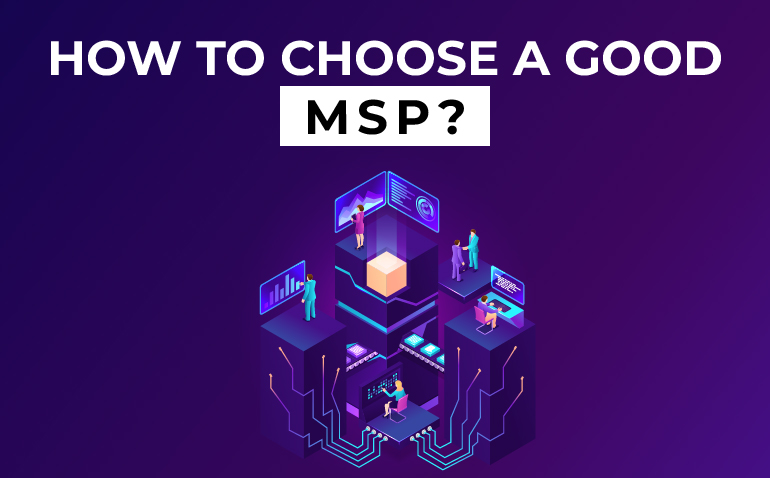In the era of digitization, Managed IT Service Providers (MSPs) have become indispensable allies for businesses across various scales. These technologically adept professionals play a crucial role in overseeing IT infrastructure, ensuring seamless operations, and enhancing security. However, the task of selecting the most suitable Service Provider is no small feat.
IT Service Providers have evolved into essential partners for businesses, offering specialized expertise, proactive management, and optimization of IT services. Their status has shifted from being optional to becoming strategic partners, underscoring the significance of making a judicious selection.
The abundance of providers in the market makes choosing the right MSP a challenging endeavor. A misstep in this decision-making process can result in inefficiencies and complications. Therefore, careful consideration is essential.
This blog aims to guide you through the process of selecting the optimal Service Provider. From comprehending your IT needs to assessing the qualifications and pricing of Managed IT Service Providers, we will provide you with the necessary insights to make an informed decision. By the end of this journey, you will be well-equipped to establish a successful partnership with an MSP that aligns perfectly with your business. Let’s commence by evaluating your distinctive IT requirements.
The Qualities of a Good MSP
Selecting the right Managed Service Provider is a crucial decision for businesses, as MSPs play a central role in maintaining IT infrastructure. To make an informed choice, it’s essential to assess the key qualities of an MSP.
- When considering an MSP’s technical expertise, certifications, and ongoing training are indicators of their commitment to staying current with industry standards. Equally important is their industry-specific experience, ensuring they understand your sector’s unique challenges and opportunities.
- In terms of service offerings, an MSP should provide a broad range of services, simplify IT management, and offer scalability to accommodate your evolving needs.
- A vital aspect is their reliability and availability, with 24/7 support and Service Level Agreements (SLAs) that guarantee uptime, reducing the risk of costly downtime.
- Lastly, cybersecurity practices and regulatory compliance are paramount, as a trustworthy MSP should protect your data and ensure your IT environment aligns with relevant regulations.
- These qualities collectively form the foundation of a successful partnership with an MSP, ensuring your business’s technological backbone is in capable hands.

1. Reputation and References
When assessing Managed Service Providers, their reliability and competence can be gauged through their reputation and references. Here’s a guide on how to evaluate this crucial aspect:
Research and Reviews: Initiate your evaluation by researching the MSP’s reputation. Delve into online reviews, forums, and social media platforms to gather feedback from both current and former clients. Pay close attention to recurring themes and overall satisfaction levels expressed by these clients.
Case Studies and Testimonials: Gain deeper insights into an MSP’s capabilities by examining case studies and testimonials. These real-world examples shed light on how the MSP has successfully addressed specific challenges and requirements of their clients. Request case studies that are relevant to your industry or specific IT needs to better assess the MSP’s competence.
Asking for Referrals: Do not hesitate to seek referrals directly from the MSP. Speaking with their current clients provides an unfiltered perspective on the quality of service, communication, and overall partnership experience. This step is invaluable in verifying the MSP’s reputation and performance.
2. Pricing and Contracts
Understanding the financial aspects of an MSP relationship is crucial to making an informed decision. Here’s what to consider in this regard:
Transparent Pricing– Ensure that the MSP provides transparent pricing. Pricing models should be precise, with no hidden fees or unexpected costs. A good MSP will offer straightforward pricing structures that align with your required services.
Contract Flexibility– MSP contracts should be flexible to accommodate your evolving needs. They should not lock you into long-term commitments that hinder your ability to adapt to changing circumstances. Seek contracts that can be adjusted as your business grows or shifts direction.
Hidden Costs to Watch Out For– Be vigilant about hidden costs that can disrupt your budget. Investigate the contract thoroughly to identify any potential hidden fees. These might include charges for additional services, out-of-scope work, or penalties for early termination. A transparent MSP will clarify all potential extra costs upfront.
3. Communication and Partnership
Effective communication and a robust partnership are imperative for a successful relationship with a Service Provider. Consider the following criteria in this context:
Accessibility and Responsiveness: Evaluate the MSP’s accessibility and responsiveness. Swift and reliable communication is essential when addressing issues. An effective MSP should be reachable 24/7 and provide timely updates regarding the status of your IT environment.
Alignment with Your Business: Select an MSP that aligns with your business’s culture, values, and objectives. Shared understanding of your company’s goals enables the MSP to better cater to your needs and function as an extension of your team.
Collaboration and Reporting: Seek an MSP that prioritizes collaboration and transparent reporting. Regular updates on the performance of your IT systems, security status, and areas for improvement are critical. A collaborative approach ensures that you and the MSP work together toward common objectives.
4. Technology Stack and Innovation
A forward-thinking IT Services Provider should possess the capability to enhance your IT environment through technology and innovation. Consider the following aspects:
Evaluation of Tools and Technologies – An MSP should demonstrate proficiency in the latest tools and technologies. Regular assessments of the efficiency and relevance of your current technology stack should be conducted, with recommendations for improvements or updates as necessary to optimize your IT infrastructure.
Adoption of Modern Solutions – Opt for an MSP that actively embraces modern solutions. Whether it’s cloud computing, virtualization, or automation, the MSP should be enthusiastic about implementing innovative technologies that can enhance productivity and security.
Future-Proofing Your IT – Future-proofing is of utmost importance. The MSP should strategically plan for your long-term success by anticipating changes in technology and business needs. This may involve developing an IT roadmap that ensures your systems remain both relevant and efficient as your business evolves.
5. Disaster Recovery and Contingency Plans
In an ever-changing world, having well-defined disaster recovery and contingency plans is imperative. Evaluate your MSP’s approach in these crucial areas:
Backup and Recovery Strategies: An MSP must establish resilient backup and recovery strategies to safeguard your data in the event of system failures, cyberattacks, or other disasters. Regular testing of these strategies is indispensable to ensure their effectiveness.
Business Continuity Planning: Your MSP should assist you in developing a business continuity plan that outlines procedures for maintaining operations in challenging circumstances. This plan should be customized to address your specific needs and potential risks.
Data Security Measures: Prioritizing data security is essential. Your MSP should implement rigorous security measures, including data encryption, intrusion detection, and regular security assessments, to shield your sensitive information from potential threats.
6. Scalability and Growth
A successful partnership with an MSP should actively support the growth and adaptability of your business. Take into account the following considerations:
Addressing Future Needs: Opt for an MSP capable of seamlessly accommodating your expanding IT requirements. Whether you’re scaling up operations or facing changes in demand, your chosen MSP should ensure that your technology infrastructure can flexibly scale to meet these evolving needs.
Navigating Expansion and Downturns: A flexible MSP should assist you in navigating both expansion phases and downturns in your business cycle. They should offer solutions for resource allocation that align with your specific circumstances, facilitating a smooth adjustment to varying demands.
Adapting to Market Trends: Remaining in tune with market trends is essential. Your MSP should possess a thorough understanding of industry shifts and technological advancements, actively assisting your business in staying competitive and responsive to the dynamic changes in the market.
Finalizing Your Decision
As you approach the final stages of choosing the ideal Service Provider (MSP), these last steps will guide you in making a well-informed and confident decision:
Comparative Analysis and Assessment: Dedicate time to compare and assess the MSPs you have researched. Compile a comprehensive list of their strengths and weaknesses, considering factors such as technical expertise, service offerings, reputation, and other qualities covered in this guide.
Request for Proposals (RFPs) and Negotiation: Initiating the request for proposals (RFPs) from the shortlisted MSPs is a pivotal step. These proposals should furnish detailed insights into their services, pricing, and expectations. When evaluating the proposals, ensure alignment with your goals and objectives.
Final Decision-Making: Armed with all the gathered information and concluded negotiations, it’s now time to make your ultimate choice. Opt for the MSP that closely aligns with your needs, provides transparency, and exhibits a dedication to your success.
Conclusion
Navigating the extensive realm of Managed Service Providers poses a challenge when seeking the ideal partner to steer your IT endeavors. Yet, a systematic approach encompassing the evaluation of technical expertise, service offerings, reputation, and various other factors can chart a course for success. Notably, Protected Harbor boasts a Five Star Google rating, and in 2022, it earned the esteemed title of the Best MSP Company in the nation as per the Best of Small Business Awards. Their dedication to delivering exemplary service and innovative solutions epitomizes the qualities one should seek in an MSP. With this assurance, you are now poised to confidently embark on your IT journey, as the keys to success within your IT environment are well within reach.
Are you prepared to embark on your business’s journey with the perfect Managed IT Service Provider? Reach out to us today for personalized guidance and support in discovering the ideal MSP to navigate your unique IT requirements. Your IT success story awaits!


